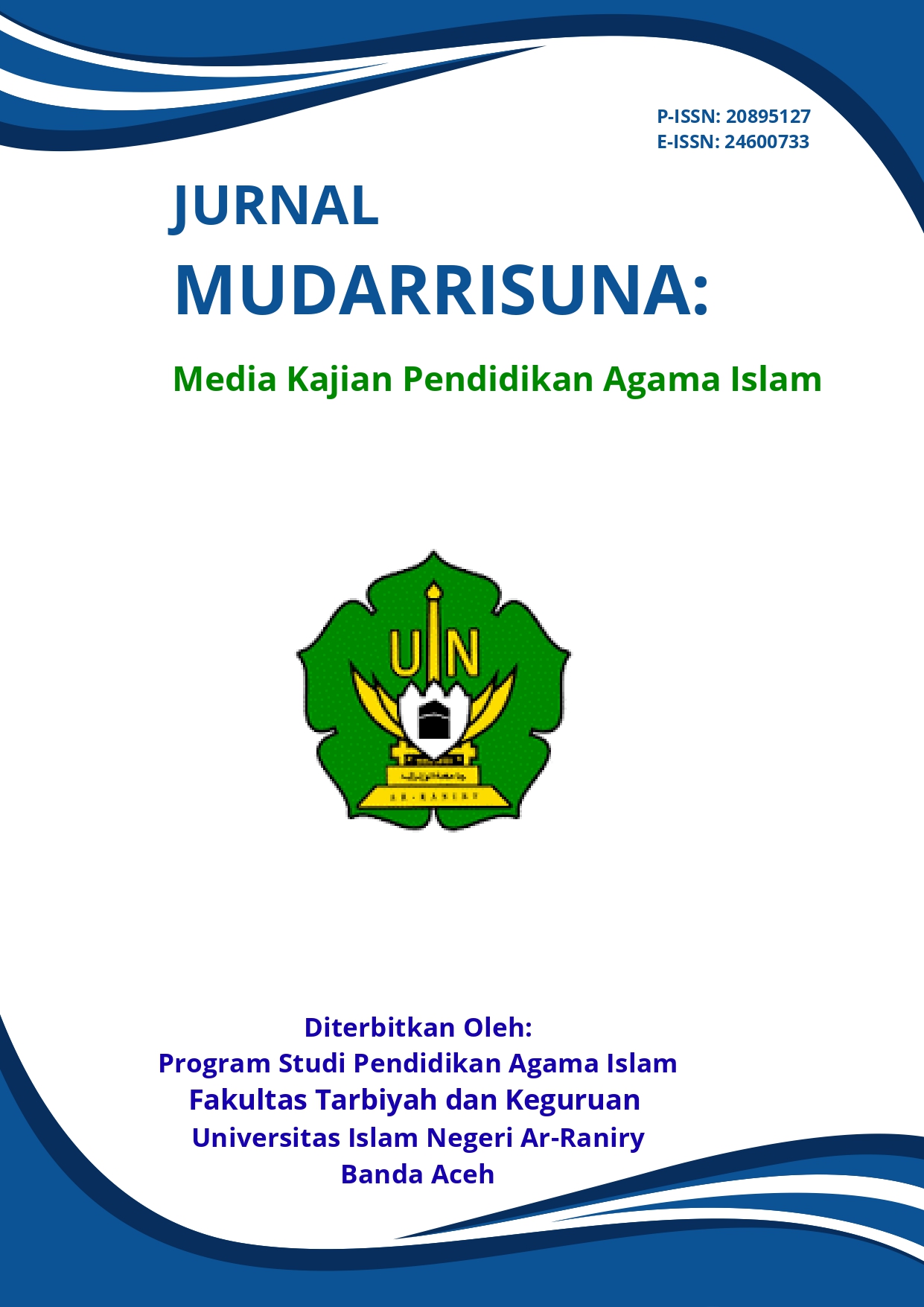Fitrah Based Education: Kesadaran Orang Tua Menumbuhkan Fitrah Keimanan Anak
DOI:
https://doi.org/10.22373/jm.v14i4.24374Keywords:
Fitrah Based Education, Parental Awareness, and Child Faith FitrahAbstract
A child since being born into the world is understood to bring the attributes that are still in the form of seeds or forerunners which are later referred to as potential, and it is the duty of parents to grow them, but there are still many parents who are not aware of this, so neglect and guidance in trying to cultivate these attributes do not occur. The research method used is qualitative which explains comprehensively by presenting the object of the problem in Fitrah Based Education, then the technique of collecting documentation data from relevant libraries which is analyzed descriptively. As a result of the research, parents need to be made aware that this faith needs to be nurtured from an early age through consistent religious education and positive spiritual experiences. The importance of role models in worship and noble character is an important aspect in shaping children's character. In addition, parents need to be actively involved in family religious activities, such as congregational prayers, reading the Qur'an together, and celebrating Islamic religious holidays.
References
Al-Bukhari, Imam. 2009. Hadits Shahih Bukhary. surabaya: Gitamedia Press.
Birdi, Dandy, and Diah Mahmudah. 2020. Membasuh Luka Pengasuhan. Bogor: Zenawa Media Giditama.
Firman, Arham Junaidi. 2017. “Paradigma Hasan Langgulung Tentang Konsep Fitrah Dalam Pendidikan Islam.” Journal Hamka 8 (2).
Gusnita. 2023. “Konsep Fitrah Based Education Dan Penerapannya Di Sekolah Dasar Swasta Alam Duri.” Universitas Islam Kasim Riau.
Hamzah, Rohana, Sarimah Ismail, and Kamarudzaman Md Isa. 2012. “Epistemology of Knowledge for Technical and Engineering Education.” Procedia - Social and Behavioral Sciences 56 (Ictlhe): 108–16. https://doi.org/10.1016/j.sbspro.2012.09.637.
Herawati, Cut Intan Hayati, and M Salman. 2021. “PERKEMBANGAN JIWA AGAMA PADA MASA ANAK-ANAK | Herawati | JOURNAL OF EDUCATION SCIENCE.” Journal of Education Science ( JES ), 7 ( 2 ), Oktober 2021 7 (2).
Lani Rahmawati, and Manpan Drajat. 2022. “Dikotomi Pendidikan Dalam Pandangan Pendidikan Islam.” Al-Afkar for Islamic Studies 5 (3): 59–69.
Luviadi, Ahmad. 2019. “Urgensi Penerapan Nilai Nilai Keimanan Untuk Meningkatkan Akhlak Mulia Pada Anak.” Ta’lim 1 (1): 49–60. https://doi.org/10.36269/tlm.v1i1.84.
Maesyaroh, Andini, Dewi Aryanti, Enung Hayati, and Akhmad Fahrul SK. 2022. “Urgensi Pemahaman Tahapan Pendidikan Fitrah Persfektif Fitrah Based Education Karya Harry Santosa.” Al-Afkar: Journal For Islamic Studies 5 (3): 157–72.
Moleong, Lexy J. 2018. Metodologi Penelitian Kualitatif. Bandung: PT Remaja Rosdakarya.
Mualimin. 2017. “PENDAHULUAN Manusia Merupakan Makhluk Yang Sangat Istimewa . Karena Manusia Dikaruniai Akal Sebagai Keistimewaannya Dibandingkan Dengan Dengan Makhluk-Makhluk Yang Lain . Manusia Merupakan Makhluk Yang Mulia Dari Semua Makhluk Yang Ada Di Alam Bumi Ini .” 8 (Ii): 249–66.
Muhaimin, A. 2019. Fitrah Dalam Pendidikan Islam: Teori Dan Aplikasinya. Jakarta: Pustaka Al-Kautsar.
Multahada. 2020. “KONSEP FITRAH DALAM PENDIDIKAN ANAK USIA DINI.” Primeearly IAIS Sambas III (1).
Munasiroh, Al, Syamsul Hidayat, and Hakimuddin Salim. 2024. “Konsep Fitrah Based Education Pada Pendidikan Anak Usia Dini ٍ ُ ل و م ل ِ ل ِ ِ و و َ ُ و َ َ ق ُ : ملسو هيلع الله ىلص الله ُ َ لو ُ ي دو َ ِ ِّ ه َ ُ ي ُ ها و ْ أ ه نا د ُ ر ْ َ ُّ ك َ لا َ َ ب َ أ َ ف ة ر َ ْ لا ى َ ل ع ِ ُ و َ أ ه ِ ِ نا س ج ِ ِ ص ه ْ” 10 (2): 486–96.
Nabila, H. 2022. “Peran Orang Tua Dan Komunitas Pendidik Pemuda Berbasis Fitrah Dan Adab (Studi Pendekatan Kualitatif Kepustakaan Buku Fitrah-Based Education).”
Putra, Muksal Mina, Fidhia Andani, Jeni Fransiska, and Putri Hairani. 2020. “Menumbuhkan Fitrah Keimanan (Kajian Konsep Fitrah Based Education).” Zuriah : Jurnal Pendidikan Anak Usia Dini 1 (1): 37. https://doi.org/10.29240/zuriah.v1i1.1909.
Ra, D I, and Diponegoro Dawuhan. 2021. “Pembiasaan Dan Keteladanan Orang Tua Program Studi Pendidikan Islam Anak Usia Dini Fakultas Tarbiyah Dan Ilmu Keguruan Institut Agama Islam Negeri ( Iain ) Purwokerto.”
Santosa, Harry. 2021. Fitrah Based Education. Jakarta: Yayasan Fitrah Wirabumi Madani.
———. 2022. “Mendidik Fitrah Keimanan.” SEKOLAH KARAKTER IMAM SYAFI’I. 2022. https://sekolahkarakter.com/mendidik-fitrah-keimanan/.
Sifa, Ficky Janani. 2023. “Program Studi Pendidikan Islam Anak Usia Dini Institut Agama Islam Negeri.” Tesis, 1–34.
Subandi. 2011. “Deskripsi Kualitatif Sebagai Satu Metode Dalam Penelitian Pertunjukan.” Jurnal Harmonia 11 (2): 173–79.
Subrata, Sumardi. 1993. Psikologi Pendidikan. Jakarta: Raja Grafindo Persada.
Syarifuddin, Nur, and M. Fauzi. 2020. “PENDIDIKAN KARAKTER PERSPEKTIF ABDULLAH NASHIH ULWAN (Tinjauan Kitab Tarbiyatul Aulad Fil Islam Dan Relevansinya Dengan Pendidikan Nasional).” Akademika 13 (02). https://doi.org/10.30736/adk.v13i02.124.
Wahyuni Murniati, Nursehan, and Nani Husnaini. 2022. “Konsep Fitrah Based Education Pada Pendidikan Anak Usai Dini.” Islamic EduKids 4 (2): 99–110. https://doi.org/10.20414/iek.v4i2.6042.
Downloads
Published
Issue
Section
License
Copyright (c) 2024 hayail umroh

This work is licensed under a Creative Commons Attribution-ShareAlike 4.0 International License.
Jurnal MUDARRISUNA: Media Kajian Pendidikan Agama Islam allows the author(s) to hold the copyright and to retain the publishing rights without restrictions. Authors who publish in this journal agree to the following terms:
- Authors retain copyright and grant the journal right of first publication with the work simultaneously licensed under a Creative Commons Attribution-ShareAlike 4.0 International License that allows others to share the work with an acknowledgment of the work's authorship and initial publication in this journal.
- Authors are able to enter into separate, additional contractual arrangements for the non-exclusive distribution of the journal's published version of the work (e.g., post it to an institutional repository or publish it in a book), with an acknowledgment of its initial publication in this journal.
- Authors are permitted and encouraged to post their work online (e.g., in institutional repositories or on their website) prior to and during the submission process, as it can lead to productive exchanges, as well as earlier and greater citation of published work.




